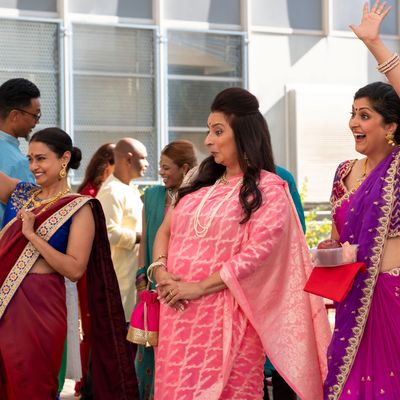
Like many children of immigrants, Devi exists in multiple worlds. The pilot establishes that there are places where she and her parents diverge: They keep vegetarian while she guzzles ribs. In this episode, taking place almost entirely at Ganesh puja, Devi begrudgingly lets Kamala wrap a sari around her and dress her up for the festivities.
In some contexts, Devi feels like she’s not Indian enough; in others, she feels like she’s too Indian. That’s a pretty common first-gen angst, and the episode looks at the underpinnings of both feelings with humor and depth. Devi’s internalized issues about her own Indianness are on full display, challenged by her friend Preeti and another friend who is home on break from Stanford. Devi tries to bond with them over rolling eyes at her own culture, but they aren’t having it. Bollywood dance is cool not dorky, Preeti argues. And her other friend shares a story about how he confronted his own internalized anti-Indian thoughts after meeting someone at college who not only continued his own cultural traditions but embraced and was proud of them. Devi doesn’t really seem to have Indian friends at school, and she likely feels like she’s always having to explain her culture and heritage. In fact, we see her do exactly that when Paxton runs into her after swim practice and asks why she’s wearing a sari. She’s embarrassed and rushes a lengthy explanation, and even though Paxton is receptive to it, interactions like these compound that embarrassment. Devi carries shame, and she’s too quick to draw lines between herself and someone like Kamala.
“Why do I think it’s so weird and embarrassing to be Indian?” Devi’s friend asks, his introspection briefly stirring something in her. Devi’s not quite ready to deal with all that, but that’s pretty par for the course for this character. She runs from feelings instead of sitting with them.
Outside of the bubble of her Indian community, though, Devi’s Indianness is indeed held against her. Nalini tasks Devi with wooing someone at Ganesh puja who happens to be a college-admissions counselor who helps get kids into Ivys. He’s white and married an Indian woman, making him a little too comfortable with considering himself a part of the community, which feels very realistic. He basically tells Devi she won’t get into an Ivy because she’s just another hardworking Indian kid. Then when he remembers who she is, he insists she should write about the greatest trauma of her life, which he reduces to a single sentence. Devi refuses to mine her life for inspiring content. What happened with her father isn’t an essay; it’s something so deeply traumatizing she’s barely even begun to process it.
Grief also forces people to split time between worlds. Every time Nalini and Devi flash back to Mohan, they are transported somewhere else. Grief splits the self, often complicating a sense of identity. Devi has always had trouble with praying, and when she does do it, it’s usually for frivolous things like bigger boobs or a kiss from Paxton. But here, her mind settles on a simple, sweet scene of playing ping-pong with her father.
Never Have I Ever deals with discomfort in humorous but incisive ways. Devi constantly puts up with seemingly harmless but ultimately insidious comments from white people. We saw it last episode in Trent’s mother, who assumed Devi might know her brow technician but also couldn’t name her. And we see it again here, when a little girl tugs Devi’s sari and asks if she’s Jasmine and then the mother makes it even worse by asking Devi to pose with her daughter for a picture for her Instagram since she looks “so cultural.” Devi’s so used to interactions like this that she almost seems bored by them.
There’s also the discomfort with which people talk to Nalini and Devi about their loss. Grief for the people experiencing it feels devastating and seismic, but for people on the outside, particularly people not affected themselves, grief becomes a spectacle. It’s something to gaze at and gossip about. The aunties at Ganesh puja make Nalini’s grief about themselves, either comparing their own trivial experiences (one woman brings up her husband’s testicular cancer, which was caught before anything bad could really happen) or selfishly inserting themselves (one auntie touts her own virtue and prayer as a reason for why Devi recovered, and another offers up a connection for a discount wheelchair, should Devi need one again). Nalini grins and bears it, little glimpses at where Devi’s anger issues might come from flaring up here and there. Never Have I Ever teases out some of the dual-edged nature of community, which can provide comfort and closeness but can also be toxic and suffocating. Even Nalini’s grief does not feel entirely hers. And Devi’s experiences are exploited by the college counselor when he suggests she use them to get into Princeton.
It’s in these gray areas and in-between spaces that Never Have I Ever really thrives. Kamala’s arc, still centered on her conflict over choosing her boyfriend Steve or her arranged engagement to Prashant, gets a little reduced in this episode. There’s a little left to be desired in her connection with Jaya, a woman who is ostracized by the community because she left a marital arrangement in order to marry her American and Muslim boyfriend. Her marriage didn’t work out, and now Jaya feels like she severed ties with her family for nothing. But there ends up being a ton to unpack here, including the internal prejudices of this Hindu community Devi’s family belongs to, that barely gets touched. Jaya is a compelling character, but she’s used too swiftly, merely a cog in Kamala’s arc. This episode brings up a lot of complicated stuff, but then doesn’t quite know what to do with it all.

